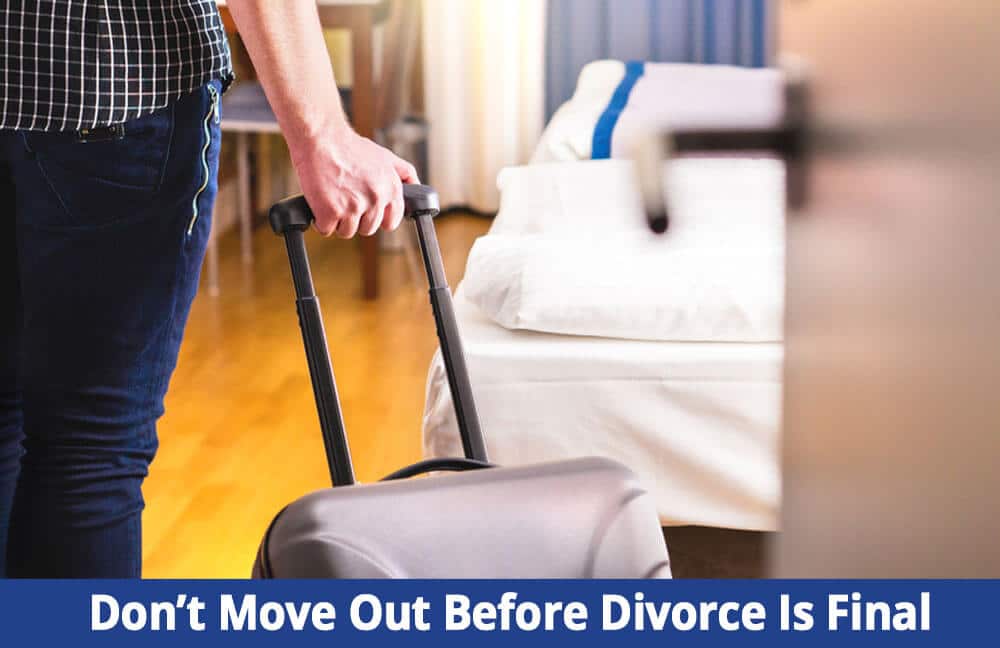Why You Shouldn’t Move Out Before Your Divorce is Final

When you decide to get a divorce, moving out of your marital home seems like the logical next step. However, this is likely to hurt you more than it will help you. It won’t necessarily make your divorce easier, nor is it necessarily in the best interests of you or your children.
Here’s why you should think again before packing up after filing for a divorce, and how to get the legal advocacy you need as you end your marriage.
The Consequences of Moving Out During Divorce
There are many consequences of leaving your home before the divorce is final, including:
Moving Out Means Abandoning the Primary Care of Your Children
If you have children with your soon-to-be-ex-spouse and move out, you will automatically be giving up primary care of them. New York courts consider you and your spouse to have an equal share of primary care when living together with your children. Once you move out or leave the home, the parent remaining is naturally seen as taking over a greater share of the primary care.
This shows the court that your spouse is the primary custodian of the children before you even have a single hearing regarding child custody — even an emergency one. Additionally, your children may not understand the nuances of your moving out and may cause them to believe you abandoned them or the divorce is your fault.
You May Have Two Households to Support While Paying for a Divorce
Divorce is costly. So is starting your life over. Adding a third financial burden to that is untenable for most people. Simply put, you may not be able to afford to pay for two households while you’re also footing the costs of getting divorced.
If you are able to somehow manage to afford all this or at least look like it, you could paint yourself into a corner when it comes to decisions regarding child support and alimony. You don’t want to appear as though you have more resources than you do, otherwise, the judge may order you to pay additional support.
You Will Lose Immediate Access to Your Belongings
Once you leave the marital home, you’ll need permission to enter it again. If your ex-spouse isn’t agreeable, this can make getting important papers, records, heirlooms, tools, and basic belongings like clothes and electronics more difficult.
If you make any attempt to gain entry after leaving and your ex-spouse has not permitted it, you could face legal action for trespassing or potentially even breaking and entering.
How to Stay In Your Home During Divorce
Be prepared to resist pressure from your ex-spouse, family, and friends to move out. You may hear that it will help make things more “peaceful,” or create less stress, but it’s important that you stay the course.
Consider moving to another area of the home if possible. Swap bedrooms with one of your children, or sleep on the sofa if you have to. Understand that things will likely be awkward for some time, but it’s the best way to protect your rights and your children’s mental and emotional wellbeing over the long term.
What to Do If You Have to Leave During Divorce
Some situations will require you to leave, such as false accusations of domestic violence or child abuse. If moving out of your marital home before the divorce is final is necessary, make sure you do the following:
- Take photographs or make copies of all important documents. Leave the originals intact where they are normally stored unless they belong to you personally.
- Create a list of all material possessions in the home and if possible, videotape or photograph them in detail.
- Move somewhere close by so you’re never more than a handful of minutes away from your children if they should get into an accident or an important decision needs to be made.
- Document all communication with your spouse in person, by text or phone, or email.
Learn the Top 12 Smart Long Island Divorce Strategies.
When to Contact a Long Island Divorce Lawyer
As soon as you discover that you’re likely going to be filing for a divorce, it’s important to retain legal counsel. It’s never in your best interest to wait while your spouse and their attorney start getting to work.
Contact Hornberger Verbitsky, P.C. today to schedule your consultation at 631-923-1910.
SCHEDULE YOUR FREE CONSULTATION TODAY
Call 631-923-1910 or fill in the form below
Schedule your complimentary consultation and case evaluation with our experienced attorneys today. When you call, you’ll speak to our friendly Client Services Director, who will be able to answer your general questions and set up your appointment with an attorney who specializes in your unique case.
At your meeting, your attorney will describe the many options available and determine together which is the right solution for you. By the end of this meeting we’ll all understand how we can best help you to move forward.
No Cost or Obligation
There is no cost or obligation for this initial consultation. It is simply an opportunity for us to get to know each other, answer your questions and learn if Hornberger Verbitsky, P.C. is right the right law firm for you. Give us a call at 631-923-1910 or fill in the short form below to schedule your free consultation and case evaluation.
All Fields Are Required